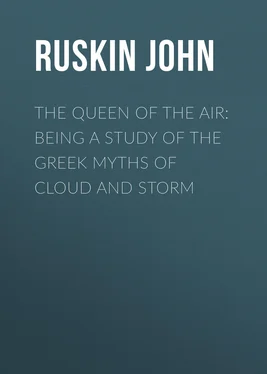John Ruskin - The Queen of the Air - Being a Study of the Greek Myths of Cloud and Storm
Здесь есть возможность читать онлайн «John Ruskin - The Queen of the Air - Being a Study of the Greek Myths of Cloud and Storm» — ознакомительный отрывок электронной книги совершенно бесплатно, а после прочтения отрывка купить полную версию. В некоторых случаях можно слушать аудио, скачать через торрент в формате fb2 и присутствует краткое содержание. Жанр: foreign_antique, literature_19, Мифы. Легенды. Эпос, на английском языке. Описание произведения, (предисловие) а так же отзывы посетителей доступны на портале библиотеки ЛибКат.
- Название:The Queen of the Air: Being a Study of the Greek Myths of Cloud and Storm
- Автор:
- Жанр:
- Год:неизвестен
- ISBN:нет данных
- Рейтинг книги:5 / 5. Голосов: 1
-
Избранное:Добавить в избранное
- Отзывы:
-
Ваша оценка:
- 100
- 1
- 2
- 3
- 4
- 5
The Queen of the Air: Being a Study of the Greek Myths of Cloud and Storm: краткое содержание, описание и аннотация
Предлагаем к чтению аннотацию, описание, краткое содержание или предисловие (зависит от того, что написал сам автор книги «The Queen of the Air: Being a Study of the Greek Myths of Cloud and Storm»). Если вы не нашли необходимую информацию о книге — напишите в комментариях, мы постараемся отыскать её.
The Queen of the Air: Being a Study of the Greek Myths of Cloud and Storm — читать онлайн ознакомительный отрывок
Ниже представлен текст книги, разбитый по страницам. Система сохранения места последней прочитанной страницы, позволяет с удобством читать онлайн бесплатно книгу «The Queen of the Air: Being a Study of the Greek Myths of Cloud and Storm», без необходимости каждый раз заново искать на чём Вы остановились. Поставьте закладку, и сможете в любой момент перейти на страницу, на которой закончили чтение.
Интервал:
Закладка:
3. It is just possible, however, also, that the story-teller may all along have meant nothing but what he said; and that, incredible as the events may appear, he himself literally believed—and expected you also to believe—all this about Hercules, without any latent moral or history whatever. And it is very necessary, in reading traditions of this kind, to determine, first of all, whether you are listening to a simple person, who is relating what, at all events, he believes to be true, (and may, therefore, possibly have been so to some extent), or to a reserved philosopher, who is veiling a theory of the universe under the grotesque of a fairy tale. It is, in general, more likely that the first supposition should be the right one: simple and credulous persons are, perhaps fortunately, more common than philosophers; and it is of the highest importance that you should take their innocent testimony as it was meant, and not efface, under the graceful explanation which your cultivated ingenuity may suggest, either the evidence their story may contain (such as it is worth) of an extraordinary event having really taken place, or the unquestionable light which it will cast upon the character of the person by whom it was frankly believed. And to deal with Greek religion honestly, you must at once understand that this literal belief was, in the mind of the general people, as deeply rooted as ours in the legends of our own sacred book; and that a basis of unmiraculous event was as little suspected, and an explanatory symbolism as rarely traced, by them, as by us.
You must, therefore, observe that I deeply degrade the position which such a myth as that just referred to occupied in the Greek mind, by comparing it (for fear of offending you) to our story of St. George and the Dragon. Still, the analogy is perfect in minor respects; and though it fails to give you any notion of the Greek faith, it will exactly illustrate the manner in which faith laid hold of its objects.
4. This story of Hercules and the Hydra, then, was to the general Greek mind, in its best days, a tale about a real hero and a real monster. Not one in a thousand knew anything of the way in which the story had arisen, any more than the English peasant generally is aware of the plebeian original of St. George; or supposes that there were once alive in the world, with sharp teeth and claws, real, and very ugly, flying dragons. On the other hand, few persons traced any moral or symbolical meaning in the story, and the average Greek was as far from imagining any interpretation like that I have just given you, as an average Englishman is from seeing is St. George the Red Cross Knight of Spenser, or in the Dragon the Spirit of Infidelity. But, for all that, there was a certain undercurrent of consciousness in all minds that the figures meant more than they at first showed; and, according to each man's own faculties of sentiment, he judged and read them; just as a Knight of the Garter reads more in the jewel on his collar than the George and Dragon of a public-house expresses to the host or to his customers. Thus, to the mean person the myth always meant little; to the noble person, much; and the greater their familiarity with it, the more contemptible it became to one, and the more sacred to the other; until vulgar commentators explained it entirely away, while Virgil made the crowning glory of his choral hymn to Hercules.
"Around thee, powerless to infect thy soul,
Rose, in his crested crowd, the Lerna worm."
"Non te rationis egentem
Lernæus turbâ capitum circumstetit anguis."
And although, in any special toil of the hero's life, the moral interpretation was rarely with definiteness attached to the event, yet in the whole course of the life, not only for a symbolical meaning, but the warrant for the existence of a real spiritual power, was apprehended of all men. Hercules was no dead hero, to be remembered only as a victor over monsters of the past—harmless now as slain. He was the perpetual type and mirror of heroism, and its present and living aid against every ravenous form of human trial and pain.
5. But, if we seek to know more than this and to ascertain the manner in which the story first crystallized into its shape, we shall find ourselves led back generally to one or other of two sources—either to actual historical events, represented by the fancy under figures personifying them; or else to natural phenomena similarly endowed with life by the imaginative power usually more or less under the influence of terror. The historical myths we must leave the masters of history to follow; they, and the events they record, being yet involved in great, though attractive and penetrable, mystery. But the stars, and hills, and storms are with us now, as they were with others of old; and it only needs that we look at them with the earnestness of those childish eyes to understand the first words spoken of them by the children of men, and then, in all the most beautiful and enduring myths, we shall find, not only a literal story of a real person, not only a parallel imagery of moral principle, but an underlying worship of natural phenomena, out of which both have sprung, and in which both forever remain rooted. Thus, from the real sun, rising and setting,—from the real atmosphere, calm in its dominion of unfading blue, and fierce in its descent of tempest,—the Greek forms first the idea of two entirely personal and corporal gods, whose limbs are clothes in divine flesh, and whose brows are crowned with divine beauty; yet so real that the quiver rattles at their shoulder, and the chariot bends beneath their weight. And, on the other hand, collaterally with these corporeal images, and never for one instant separated from them, he conceives also two omnipresent spiritual influences, as the sun, with a constant fire, whatever in humanity is skilful and wise; and the other, like the living air, breathes the calm of heavenly fortitude, and strength of righteous anger, into every human breast that is pure and brave.
6. Now, therefore, in nearly every myth of importance, and certainly in every one of those which I shall speak to-night, you have to discern these three structural parts,—the root and the two branches: the root, in physical existence, sun, or sky, or cloud, or sea; then the personal incarnation of that, becoming a trusted and companionable deity, with whom you may walk hand in hand, as a child with its brother or its sister; and, lastly, the moral significance of the image, which is in all the great myths eternally and beneficently true.
Читать дальшеИнтервал:
Закладка:
Похожие книги на «The Queen of the Air: Being a Study of the Greek Myths of Cloud and Storm»
Представляем Вашему вниманию похожие книги на «The Queen of the Air: Being a Study of the Greek Myths of Cloud and Storm» списком для выбора. Мы отобрали схожую по названию и смыслу литературу в надежде предоставить читателям больше вариантов отыскать новые, интересные, ещё непрочитанные произведения.
Обсуждение, отзывы о книге «The Queen of the Air: Being a Study of the Greek Myths of Cloud and Storm» и просто собственные мнения читателей. Оставьте ваши комментарии, напишите, что Вы думаете о произведении, его смысле или главных героях. Укажите что конкретно понравилось, а что нет, и почему Вы так считаете.












